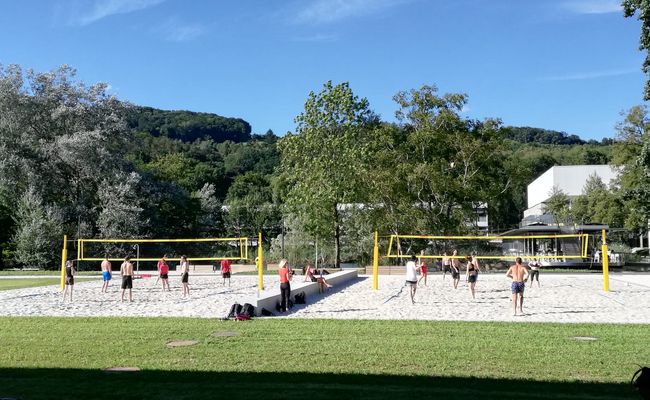The most important thing is to be interested in the field. A good engineer must also, of course, master his or her field well, but there is more to it: After graduation, our students work professionally as part of a team. In this regard, it is very important to be able to present solutions to various problems and learn how to be a team player.
Self-driving cars, drones, smartphones - as an electrical engineer you build chips, sensors & automation technology. As a student in the Electronics and Information Technology program, you study THE key technologies that define the 4.0 industrial revolution .
How do you build drones and electronic medical devices? How do you make technology and artificial intelligence fit into the smallest of spaces? How does software and hardware work together?
The Bachelor's degree program in Electronics and Information Technology (ELIT) focuses on learning how the smallest electronic devices are built, how they are networked, how they communicate, and how they process their data. You will learn how to feed them with artificial intelligence and integrate them into larger systems.
Chips, sensors, electrical circuits are your playground and you get to build them, get them to work and transmit the data. You will design new systems and solve the problems we encounter every day when it comes to our smartphones, laptops, cars, etc. in places such as at hospitals and at industry 4.0 companies. Electronics and Information Technology is what creates the basis to evaluate data, initially making everything our modern world possible.
The program is based on broad foundations of principles in engineering and natural sciences: Electrical engineering, computer science, physics, and mathematics.
Page Content
Key Facts
Degree
Bachelor of Science (BSc)
Duration
6 Semesters
ECTS
180 Credits
Language
German (Level B2)
Location
Linz
Program
Full-Time
-
JKU Open House 2025 Visit us on April 4 and 5, 2025, at the Kepler Hall on campus and learn more about the academic degree programs we offer!
Learn more
Why This Degree is Particularly Attractive
- Our program structure gives undergraduate students a unique opportunity to work together with experienced colleagues in a laboratory environment to set up measurements and conduct experiments.
- Our faculty members have strong, networking connections with industry representatives from around the world. You actively take part in collaboration efforts with industries to conduct hands-on work and address real-world problems.
- If you have a specific area of interest, we can give you the space you need to pursue your interests. Learn more about different fields such as signal processing, become a big data analyst, discover circuit technology, or design computer chips.
- Joint lectures with classmates in other majors give you an opportunity to build up a cross-disciplinary network at the JKU campus and also provide the corresponding base-knowledge foundations you need in mathematics, computer sciences and physics.
- Start with ELIT and study a variety of options: You start your degree program together with students studying mechatronics and mechanical engineering. This gives you a taste of different fields and areas and after your first year of studies, you can easily switch to mechatronics or mechanical engineering, if you want.
Did You Know?
It's pretty safe to say that you can receive messages on your smartphone with the help of a chip developed in Linz. JKU spin-off companies developed these globally used chips. Vehicle radar distance sensors were also made in Linz and currently have a world market share of approximately 50%.
Program Structure
The Bachelor's degree program in Electronics and Information Technology consists of the following areas:

Studies Introduction and Orientation Phase (StEOP)
New students will be required to complete the StEOP requirements at the beginning of the Bachelor's degree program. The StEOP requirements consists of certain courses that are outlined in the curriculum. Before completing the StEOP courses, you can only get limited academic credit when you take additional courses.
Main Areas of Focus
You will receive solid, well-grounded education in mathematics, electrical engineering and computer science as well as in hardware and software design:
- Microelectronics, Microsystems Technology and Circuit Technology: Chips (integrated circuits) are the main focus, along with very small electronic circuits and systems.
- Communications and High-Frequency Technolog: You are actively involved in saving, transmitting and storing data as well developing circuits.
- Signal and Information Processing: Here you will learn to evaluate received and measured technical information as well as correctly assess the acquired data.
- Measurement Technology and Sensor Technology: The focus here to measure changes in technical systems.
- Automation and Drive Technology: You learn how to control and regulate machines and make them "smarter".
- Medical and Bioelectronics: You will learn how to develop chips able to detect diseases even faster or build prostheses people can control themselves, such as an artificial hand.
- Modern Physics, Computer Science: In addition, you will acquire exciting knowledge from modern physics and important programming skills.
Study for a Day
Are you interested in one of our academic degree programs? Visit our JKU campus and hang out with a JKU student. You can attend a class and get first-hand information about studying at the JKU. Click here for sign up.
JKU student Sabrina talks about studying Electronics and Information Technology
Let ELIT major Sabrina give you an insight into everyday life at the university.
What You Will Learn in the Program
Solid, base-knowledge education is a main part of the Bachelor’s degree program ELIT. These foundations serve as a base for later scientific work and engineering activities. Graduates have:
- A comprehensive education and strong aptitude in the mathematical, scientific and theoretical disciplines. You can apply these skills efficiently to real-world tasks. You learn how to take the right approach to technical problems and heighten your intuition to know how to approach a situation, find solutions, and address the challenge.
- Learn how to use artificial intelligence in real-world systems such as smartphone chips and driver assistance systems.
- Analytical thinking skills and a technical understanding so that you can analyze, understand and solve problems from the ground up as well as across disciplines in all areas of business, administration, education and social issues.
- Specialize at an internationally recognized academic and scientific level in a sub-area of Electronics and Information Technology.
- A strong social skill set, the ability to work effectively as part of a team, leadership skills, and a high degree of personal responsibility.
ELIT allows you to specialize in many areas including chip development, communications engineering, sensor technology, control engineering, signal and information processing, and artificial intelligence. Students in the Master's degree program will then be able to focus more intensively on a preferred area of expertise. At this point, you will then also independently conduct your initial research work.
Your Career Prospects
As an engineer in Electronics and Information Technology, you can pursue a career in electronics or in the automotive industry as well as in medical technology or in communications. Your main skills include developing, producing and marketing components as well as systems and software. Here are a few concrete examples:
- Communication: Develop smartphone chips for the next generation of mobile smartphones.
- Medicine and Healthcare: You can develop chips to perform countless chemical operations or develop algorithms for ultrasound devices. You can actively revolutionize medical diagnostics.
- Self-Driving Vehicles: Together with artificial intelligence (AI) experts, you improve safety features in self-driving cars - such as radar sensors, for example - to reliably recognize others on the road.
- Development Engineer: The systems you develop may be able to solve tasks more efficiently and reliably or ensure that a company's products meet all the necessary requirements.
- System Designer: You make sure that a company's products fit well into a higher-level product or that components communicate smoothly with each other. You develop solutions for a customer's particular requests. You make sure that programmers, developers, and other experts work effectively together.
- Start-Up Company: Take your original idea and run with it by starting your own business.
ELIT GRADUATES ARE IN HIGH DEMAND!
Outstanding research and education in Linz means the JKU continues to attract the attention of internationally active high-tech companies.
Learn more in this OÖN article (German only, PDF), opens a file in a new window.

Admission to Studies
Admission Requirements
In order to be admitted to the Bachelor's degree program, you must fulfill the following requirements.
- Hold general higher education entrance qualifications (such as an Austrian "Matura" diploma )
- If your first language is not German, you will be required to submit proof of B2 level of language proficiency in German.
Still Have Questions?
Then contact us!
Department
Admissions Office
Building
Earning an Academic Degree without a "Matura" Diploma - How?
Did you know that you can enroll at the university to pursue an academic degree without holding a qualifying school-leaving certificate? Learn more now!
Frequently Asked Questions
Do you sometimes look at your smartphone and wonder how you get information from the internet on your phone? Do you look at your laptop or PC and wonder how all of the computer chips are made? Do you want to understand and help develop these kinds of chips? The most important thing is to have a sense of curiosity and to want to understand the technical basics behind all sorts of things we use in our everyday lives.
If you want to be absolutely sure you’re choosing the right major, you can also take part in the JKU Young Scientists Program for Electronics and Information Technology, opens an external URL in a new window, Upper Austria's most comprehensive support program for gifted school students. You can start the JKU ‘Young Scientists’ programs as an upper level AHS or BHS student and learn more about this field. In your spare time, you can attend workshops at the JKU focusing on electronics and information technology. This gives you initial contact with professors and a taste of campus life.
ELIT focuses on smaller circuits as well as smaller voltages and currents.
Electrical engineering focuses on, among other things, large voltages and currents (such as those found in large electric motors; in power transmissions, etc).
Mechatronics ("Mechanics and Electronics") focuses on large, modern engineering systems made of mechanical, electrical and electronic parts and controlled by software (such as modern cars, household appliances, and robots). Core disciplines include mechanical engineering, electrical engineering, and computer sciences.
At the university, you will generally learn how to apply scientific principles and existing technologies as well as advance them further. You learn how to work in a scholarly way, how to conduct research, and how to break new ground. This makes you more flexible and allows you to quench your thirst for research to the fullest.
Oftentimes it can happen that in addition to studying, students begin working at a company or even at the university. In this case, however, these tend to be part-time jobs (only a few hours a week) rather than full-time jobs.
The JKU offers preparation courses, opens an external URL in a new window for this academic degree program. Material from higher-level schools is reviewed in a condensed format, designed to help you prepare for introductory, university-level courses. These courses are for newly enrolled students. Attendance is optional.
In addition, new students can take part in a mentoring program, opens an external URL in a new window. Professors and other JKU faculty members meet in small groups with newly enrolled students provide tips and advice about studying in the program.
Still Have Questions?
Do you need help registering or do you have questions about the program? Contact the JKU's Office of Student Information and Academic Advising (SIBS)!
STAY UP-TO-DATE
... and sign up to receive the JKU Newsletter for prospective students! Everything you need to know about studying at the JKU, upcoming events. and what's new.
Advanced Degree Programs
After completing your undergraduate degree, you can continue your education by pursuing an advanced degree:
Similar Degree Programs
These programs could also be of interest:
-
All Bachelor's & Diploma Degree Programs
Overview





